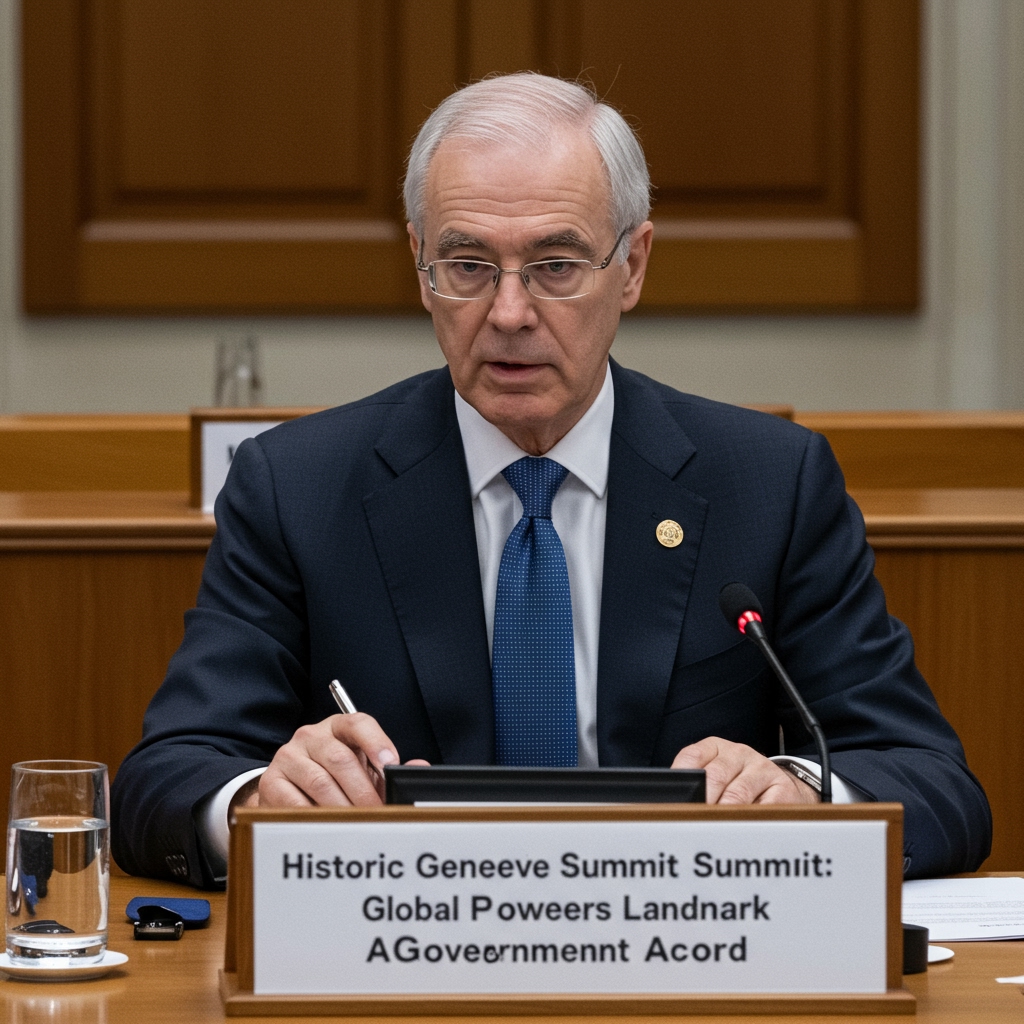Global Powers Ink Landmark AI Governance Accord in Historic Geneva Summit
Geneva, Switzerland – In a pivotal moment for international cooperation in the age of artificial intelligence, representatives from over 50 nations converged in Geneva on January 28, 2025, to officially sign the landmark Global AI Governance Accord. This significant agreement marks a concerted effort by a diverse group of countries, including major global players such as the United States, the European Union (representing its member states), China, and the United Kingdom, to establish a foundational framework for navigating the complex landscape of AI development and deployment on a global scale. While the Accord itself is non-binding, its signing is widely seen as a crucial first step towards fostering greater alignment and collective responsibility in addressing the potential risks and ensuring the beneficial development of AI technologies.
The Accord’s Framework: Principles for a Shared Future
The Global AI Governance Accord is designed to serve as a blueprint for international collaboration, focusing primarily on AI safety and risk management. It explicitly emphasizes the importance of shared principles intended to guide both national policies and international initiatives. Key among these foundational tenets are transparency, accountability, and the development of robust safety standards for advanced AI systems. Transparency is highlighted as essential for understanding how AI systems operate and make decisions, fostering trust and enabling effective oversight. Accountability underscores the necessity of clearly defined responsibilities when AI systems malfunction or cause harm. The focus on robust safety standards reflects growing concerns about the potential for sophisticated AI models to exhibit unexpected or undesirable behaviors, necessitating rigorous testing and safety protocols.
Key Provisions and Collaborative Initiatives
A central element of the newly signed Accord is the proposal for the creation of a new international working group. This group will be tasked with a critical mandate: to develop common metrics for assessing AI capabilities and risks. The lack of globally recognized standards and methods for evaluating the power and potential dangers of AI systems has been a significant hurdle in international discussions. By establishing common metrics, the working group aims to provide a shared language and framework for understanding and comparing different AI systems, facilitating more informed policymaking and risk assessment worldwide. The Accord sets a clear timeline for this endeavor, requiring the working group to report its initial findings by Q3 2026. This deadline underscores the urgency felt by signatory nations to make tangible progress in this area.
International Cooperation and Participation
The sheer breadth of participation in the Geneva summit and the signing of the Accord is notable. The presence of representatives from over 50 nations, encompassing a wide range of political systems, economic development levels, and technological capabilities, speaks to the universal recognition of AI’s transformative potential and the shared need for global coordination. The inclusion of major powers like the United States, the European Union, China, and the United Kingdom, often at odds on other geopolitical issues, signals a rare convergence of interests rooted in the understanding that AI’s challenges transcend national borders. This level of global consensus, even in a non-binding agreement, is a powerful indicator of the international community’s commitment to addressing AI governance collectively. The discussions leading up to and during the summit involved extensive diplomatic efforts to bridge differing national perspectives and find common ground on fundamental principles and areas for collaboration.
Addressing Pressing Concerns
Discussions held during the Geneva summit highlighted specific areas of concern that the Global AI Governance Accord aims to address, directly or indirectly. Prominent among these were worries surrounding frontier AI models – the most advanced and powerful AI systems currently being developed – and the proliferation and potential use of autonomous weapon systems. Frontier models, with their rapidly expanding capabilities, raise questions about controllability, unintended consequences, and potential misuse. Autonomous weapon systems bring complex ethical, legal, and security challenges, including issues of human control over the use of force. By emphasizing principles of safety, transparency, and accountability, and by proposing mechanisms for assessing capabilities and risks, the Accord lays the groundwork for future international efforts to mitigate the dangers associated with these cutting-edge applications of AI. The unified global effort signaled by the Accord’s signing reflects a proactive stance towards managing these potential societal impacts before they become insurmountable challenges.
Significance and Future Outlook
While the non-binding nature of the Global AI Governance Accord means it does not immediately impose legal obligations on signatory states, its significance lies in establishing a shared set of principles and a commitment to ongoing international dialogue and collaboration. It represents a global acknowledgement that managing AI requires a coordinated approach, transcending individual national regulations. The proposed international working group on common metrics is a concrete outcome that could pave the way for more substantive agreements in the future. Challenges remain, including ensuring widespread adherence to the Accord’s principles, adapting the framework to the rapid pace of technological change, and navigating differing national approaches to AI regulation and innovation. Nevertheless, the Geneva Accord provides a vital foundation for building trust, sharing information, and developing common understanding necessary for the responsible development and deployment of artificial intelligence for the benefit of all nations. This historic signing in Geneva sets a precedent for global cooperation on critical technological frontiers.





